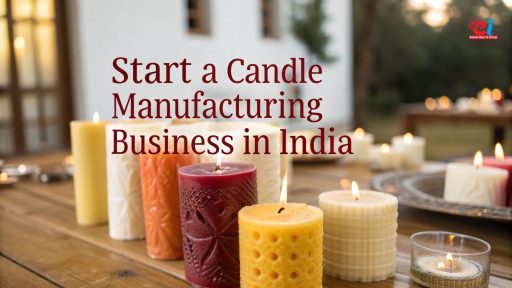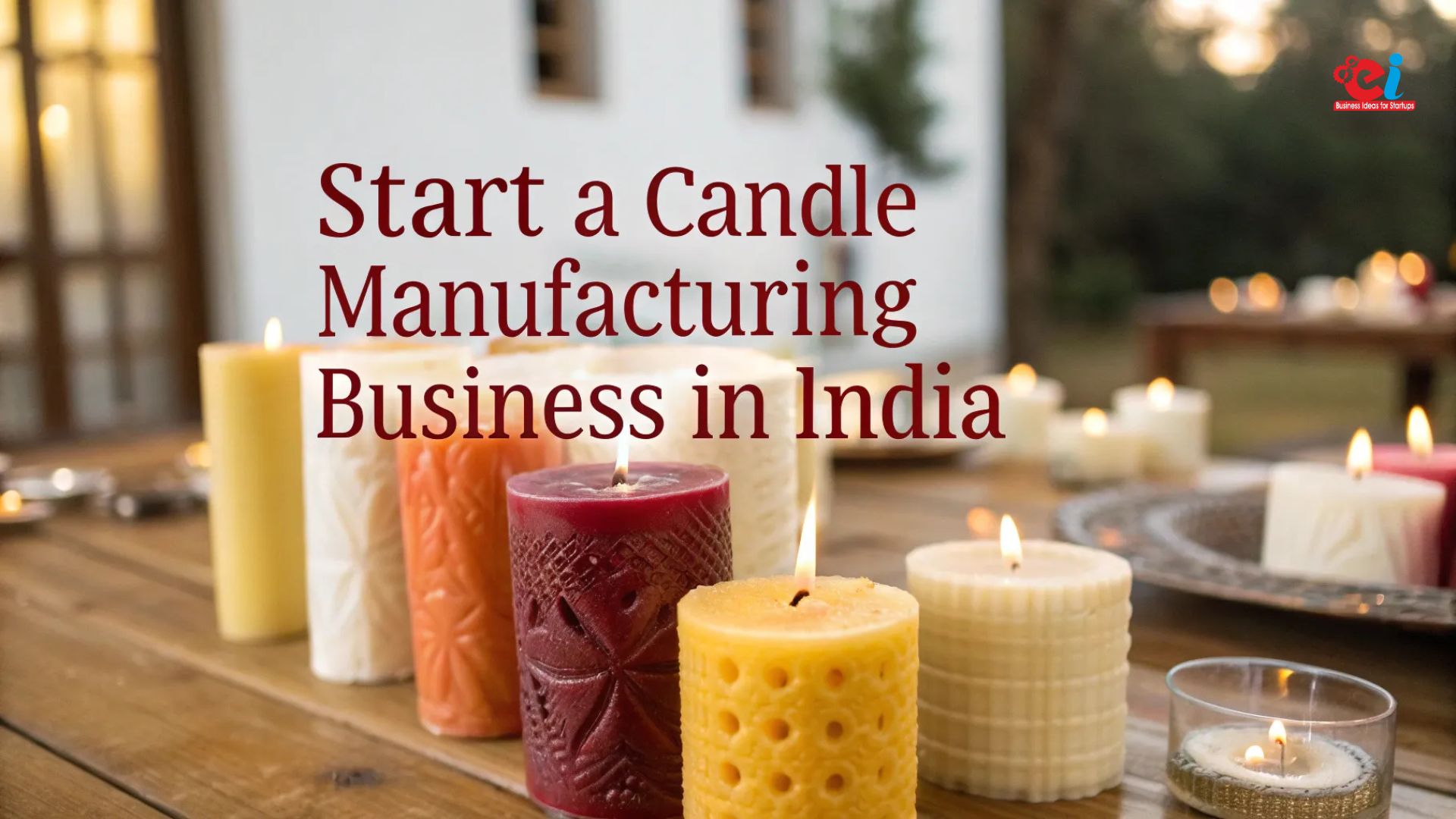Why Candles Are Lighting Up the Business Landscape
The modern-day candles have advanced beyond their initial function. From religious rituals to interior decor and wellness routines to customized gifts, candles now represent luxury, mood, and peace of mind. In India, the industry of candle manufacturing business is growing slowly into a lucrative, low-barrier business that is ideal for entrepreneurs with small budgets, particularly people who work from home.
Inspiring by the growing demand of consumers for handmade, eco-friendly and fragrant products The Indian candle Manufacturing Business industry provides an enormous opportunity for entrepreneurs of the first generation. It doesn’t require a large infrastructure, and the ingredients are easily obtainable and branding can make an enormous difference to marketing positioning. The kitchen area could be your initial production line.
This article gives a complete step-by-step guideline for launching and expand the candle manufacturing business in India. From knowing market trends, to selecting the right materials, managing production and scaling up with the use of branding as well as e-commerce. We’ll help you through every step of the process. You may be a homemaker, an innovative freelancer, or an MSME seeking a new business This business is a great opportunity for you.
Market Potential: The Soaring Demand for Candles in India
What was once something that was only available during the holidays is now an all-year-round, multi-purpose product for living. The Indian consumer wants more than just lighting; they are seeking more experiences. Candles that soothe and decorative candles for home aesthetics, candles that are spiritual for rituals, as well as eco-candles for sustainable living — all represent distinct segments of this market.
The tradition of gifting in India, particularly during marriage ceremonies, Diwali, Raksha Bandhan as well as corporate events has also driven up the demand. People are more inclined to invest in local and handmade items, particularly when they are accompanied by an interesting story, a scent and environmentally friendly packaging.
This has opened up huge opportunities for small candle companies to create unique, quality products, without competing with mass-produced manufacturers.
Related: How to Start a Profitable Candle Business from Home
Market Size and Growth Forecast
The candle manufacturing business in India is growing at a rapid pace. In 2023, the industry was estimated to be around 1,750 crore. The projections that it will be higher than the figure of Rs3,200 in 2028. Global players have witnessed the effects of the Indian consumer’s desire for health and beauty products, in addition, Indian entrepreneurs are in a good position to cater to this demand both locally and internationally.
Indian Candle Market Forecast (2023-2028)
| Year | Estimated Market Size (INR Cr) | Growth Rate |
| 2023 | Rs1,750 | 12.5% |
| 2024 | Rs1,970 | 12.6% |
| 2025 | Rs2,220 | 12.8% |
| 2026 | Rs2,520 | 13.2% |
| 2027 | Rs2,870 | 13.5% |
| 2028 | Rs3,250+ | 13.8% |
The market has both established brands and a plethora of independent, small-scale manufacturers which, in many cases, started their business from the home of the manufacturer. With exports also increasing–especially to countries like the US, UK, UAE, and Australia–there is a strong incentive to standardize production and brand identity.
Understanding Candle Types and Target Segments
For a producer, selecting your product’s niche early can help identify your target market and persona. Although candles made of paraffin are still popular because of their cost but the contemporary consumer is moving to soy wax and beeswax candles, as well as gel-based candle, especially to enhance their wellness and décor.
- Aromatherapy candles are great for meditation and yoga segment.
- Candles made of gel with floral or decorative elements are well-liked in high-end design.
- Environmentally conscious buyers prefer soy wax in glass jars made of recycled material.
- For special occasions or gifting, it is possible to create boxes with a variety of fragrances and labels that are custom.
The business lets you develop collections, design themed sets and design packaging that is a blend of Indian traditional values and contemporary tastes. Focusing on a particular use case, such as “Diwali Decor,” “Wedding Favors,” or “Work-from-Home Wellness”-can increase the market ability of your product and build customer loyalty.
Raw Materials and Equipment You’ll Need
In order to begin production you’ll require the following items:
- Wax: Select from paraffin (most inexpensive) or soy (eco-friendly) beeswax (premium) as well as gel (aesthetic).
- Wicks: Type and size depend on the size of the jar as well as wax. Wicks made of wood or cotton are the most commonly used.
- Essential Oils or Fragrance Oils: Lavender, rose sandalwood, vanilla and lemongrass are very popular.
- Colorants: Natural or dyes. pigments that give hue.
- Jars or molds: Based on your company’s design, whether it’s glass, metal or ceramic.
- Double Boiler or Wax Melter: Secure and uniform melting of wax.
- Thermometers and Pouring pots: To control temperatures and minimize the amount of waste.
- Packaging: Boxes, labels, tags, jute bags and safety tips.
The equipment listed here isn’t excessively expensive. A micro-manufacturing machine can be setup without much investment, and later increased using automation and batch testing tools.
The Step-by-Step Manufacturing Process
After the raw materials are put set, the candle manufacturing business process follows a specific but cautious process. Start by slowly heating the wax to a temperature that is appropriate to your particular type of wax. Essential oils must be added once the wax is cooling slightly to maintain the integrity of the scent. The mixture is then put into containers in which the wicks have already been placed and secured with holders.
The candles should remain cool and unaffected. Once the wick is solidified, it is cut and the surface polished or cleaned and the candle is then cured to ensure fragrance bonding (especially with soy-based wax). The candle is then sealed, labeled and stored in a dry, cool area.
Manufacturing may sound simple but quality control is vital. Tests in batch, burn-time tracking and the alignment of wicks as well as evaluation of scent throw and safety compliance are essential for anyone who wants to establish an established brand name and prevent complaints or returns.
Related: Candle: Making and Designing Trends
Packaging, Branding & Selling Strategy
In the case of candles, the packaging is more than just protecting – it can also be a source of revenue. Think about how people “shop with their eyes” on Instagram or Amazon. A photo that is high-quality of a soy candle with a scent in a glass jar with a matte finish with a wooden lid could beat a dimly lit image of a candle made from paraffin, even if the scent is identical.
Packaging Tips:
- Select packaging that reflects your brand image.
- Eco pouches, Kraft boxes, jute ties, or personalizing messages provide worth.
- The label design should align with your brand’s visual identity—font, color, scent name, instructions, and burn time.
Build Your Brand
- Introduce a collection that is unique.
- Tell your founder’s story, including why you selected a particular scent, and what it represents.
- Showcase your process—hand pouring, sustainable ingredients, etc.
- Use images of candles in real-life places like desks, homes and altars.
Your marketing starts with your packaging and then continues with your storytelling.
Where and How to Sell: Online, Offline, and Export Channels
Candle brands of today must be digitally native in order to survive. It doesn’t mean you have to have an entire tech team, just the smartphone, a credit card gateway and a platform strategy. Instagram Shops Facebook Marketplace, Meesho, Flipkart, Amazon, and even your personal Shopify store are all excellent starting places.
Engaging Content That Converts
- Candle-making videos
- Fragrance reviews and previews
- Behind-the-scenes activities
- Customer testimonials
Offline Sales Channels
- Exhibitions of lifestyle and Diwali Melas
- Wedding expos to purchase gift sets
- Boutique gift shops and home decor stores
- Pop-ups at cafes, malls, or in the streets
- Wellness centers and yoga studios
Export Possibilities
The potential for export is high. After standardization, your candles are able to be advertised for sale on Etsy, Faire, and similar platforms across the globe. NPCS can assist you in assessing the possibility of export readiness by providing feasibility reports.
Legal Compliance and Safety Requirements
If you want to start with your own your own home, you don’t require an entire manufacturing license right away. However, if you plan to expand, you should apply for:
- Udyam (MSME) Registration
- GST Number (mandatory for turnovers of more than Rs20 lakh)
- Trademark for Brand Protection
- NoC for Fire and Safety (for greater units)
- Ingredient Labeling (to meet safety and export standards)
Even for small-scale companies, safety is a top concern. Store fire extinguishers away from flames, store wax away from the flame and keep rooms aerated by using essential oils.
Watch this video for more information
How NPCS Can Help You Launch and Scale
NIIR Project Consultancy Services (NPCS) has assisted hundreds of entrepreneurs start and expand their industrial and consumer product companies in India. When it comes to candle manufacture, they have essential resources to avoid beginner mistakes and accelerate your path.
- NPCS produces Market Survey cum Techno Economic Feasibility Reports designed specifically for your budget, location and industry.
- These reports provide manufacturing process information as well as suggestions for layout of the plant, the source of raw materials, and the projected margins for profit.
- NPCS assists entrepreneurs in evaluating legal, technical and commercial viability prior to making a decision to invest.
Whether you’re launching a boutique home business or expanding into B2B gifting and exports, NPCS provides the tools, knowledge, and resources to help you succeed.
Conclusion: A Business That Sells More Than Light
Manufacturing candles in India is more than just a business, it’s an exciting journey that has great financial potential. Your customers are offered peace, scent and beauty. You are also offering your customers a sense of purpose. It doesn’t matter if it’s a jar of lavender to unwind or a marigold candle to celebrate Diwali or a simple soy wax candle to place on a table for dinner candles are now a source of emotional significance and are popular with consumers.
The costs for starting are low and the learning curve is easy, and the potential for branding is enormous. For those who want to start a business in 2025 and are seeking a sustainable creative, imaginative and rewarding business — the candle manufacturing business is waiting.









